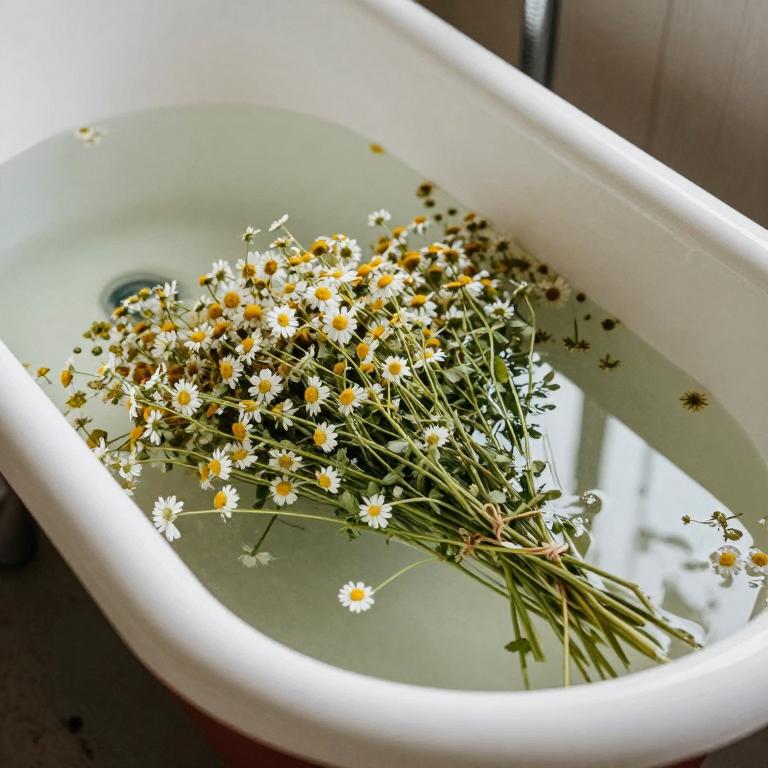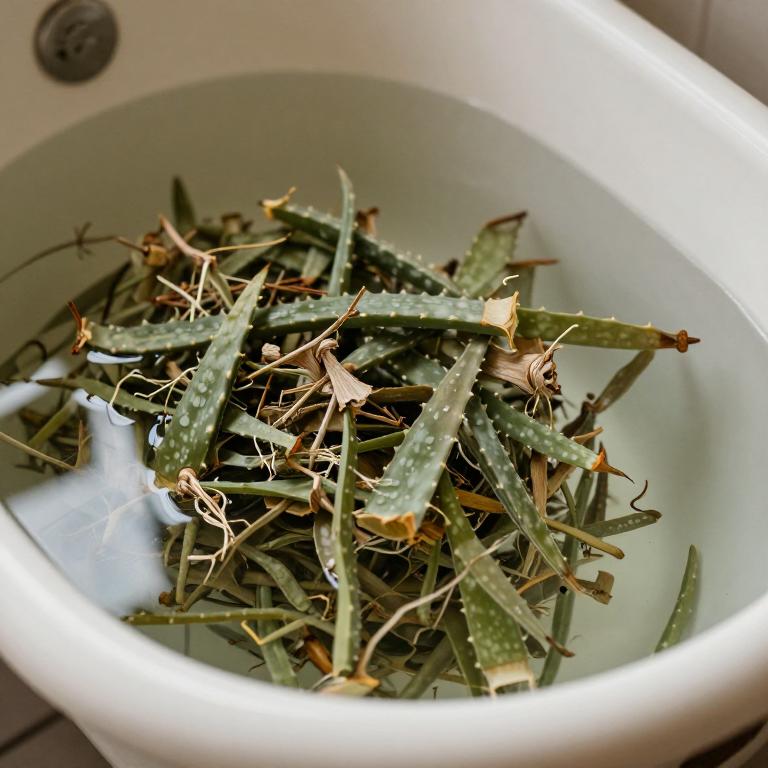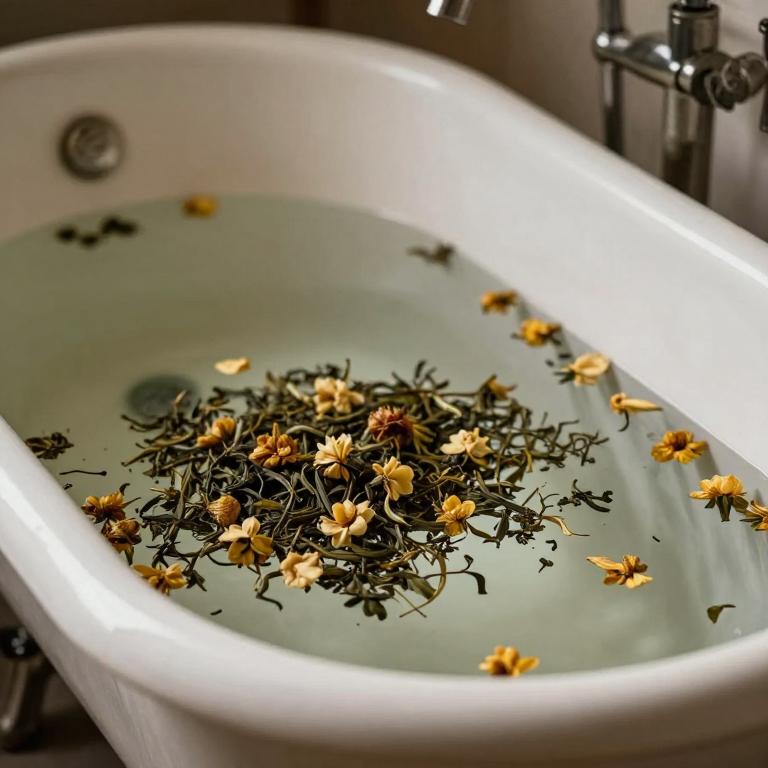10 Best Herbal Baths For Sunburn

Herbal baths can be a soothing and effective remedy for sunburn, offering natural relief from pain and inflammation.
Herbs such as lavender, chamomile, and calendula are commonly used due to their anti-inflammatory and calming properties. Soaking in a warm bath infused with these herbs helps cool the skin and promote healing by reducing redness and irritation. To prepare an herbal bath, simply steep the chosen herbs in hot water and then add the infused water to a tub.
This gentle, holistic approach not only provides comfort but also supports the skin's natural recovery process.
Table of Contents
- 1. Chamomile (Matricaria chamomilla)
- 2. Aloe vera (Aloe barbadensis)
- 3. St. john's wort (Hypericum perforatum)
- 4. Marigold (Calendula officinalis)
- 5. Stinging nettle (Urtica dioica)
- 6. English lavender (Lavandula angustifolia)
- 7. Salvia (Salvia officinalis)
- 8. Dog rose (Rosa canina)
- 9. Field horsetail (Equisetum arvense)
- 10. Camellia (Camellia sinensis)
1. Chamomile (Matricaria chamomilla)

Matricaria chamomilla, commonly known as chamomile, is a gentle herbal remedy that can be used in baths to soothe sunburned skin.
Chamomile contains anti-inflammatory and antioxidant properties that help reduce redness, irritation, and discomfort associated with sunburn. To prepare a chamomile bath, steep a handful of dried chamomile flowers in hot water for about 10 minutes, then strain the liquid and add it to a warm bath. Soaking in this bath for 15 to 20 minutes can provide relief and promote skin healing.
It is important to ensure the water temperature is not too hot to avoid further irritating the skin.
2. Aloe vera (Aloe barbadensis)

Aloe barbadensis, commonly known as aloe vera, is often used in herbal baths to soothe and heal sunburned skin.
The gel extracted from the aloe plant contains anti-inflammatory and moisturizing properties that help reduce redness, swelling, and pain associated with sunburn. When added to a warm bath, aloe vera can provide a cooling effect, offering relief from the discomfort of sunburn. It also helps to hydrate and repair the skin's barrier, promoting faster healing.
However, it is important to ensure that the aloe used is pure and free from irritants to avoid any adverse reactions.
3. St. john's wort (Hypericum perforatum)

Hypericum perforatum, commonly known as St. John's wort, has been traditionally used in herbal baths to soothe and heal sunburned skin.
The plant contains compounds like hypericin and flavonoids, which possess anti-inflammatory and antioxidant properties that can help reduce redness and irritation. To prepare a St. John's wort bath, the dried herb is steeped in hot water to create a soothing infusion, which is then added to warm bathwater. Soaking in this bath for 15 to 30 minutes can provide relief by cooling the skin and promoting healing.
However, it is important to note that St. John's wort can increase sensitivity to sunlight, so it should be used with caution and not applied directly to the skin if there is an existing sunburn.
4. Marigold (Calendula officinalis)

Calendula officinalis, commonly known as pot marigold, is a herbal remedy widely used for its soothing and anti-inflammatory properties.
When incorporated into herbal baths, calendula can provide relief for sunburn by cooling the skin and reducing redness and irritation. The anti-inflammatory compounds in calendula, such as flavonoids and triterpenes, help to calm the skin and promote healing. To prepare a calendula bath, steep dried calendula flowers in hot water, then add the infused liquid to a warm bath.
This gentle, natural treatment can be a comforting and effective way to soothe sunburned skin while supporting the body's natural healing process.
5. Stinging nettle (Urtica dioica)

Urtica dioica, commonly known as stinging nettle, has been traditionally used in herbal baths to alleviate the symptoms of sunburn.
The leaves of this plant contain compounds that can soothe irritated skin and reduce inflammation when used in a bath. To prepare a nettle bath, fresh or dried nettle leaves are steeped in hot water and then used to create a soothing soak. This natural remedy helps to cool the skin, ease pain, and promote healing by reducing redness and itching.
While it is generally safe, individuals with sensitive skin should perform a patch test before using nettle baths to ensure no allergic reaction occurs.
6. English lavender (Lavandula angustifolia)

Lavandula angustifolia, commonly known as English lavender, is often used in herbal baths to soothe and heal sunburned skin.
The calming aroma of lavender not only promotes relaxation but also has anti-inflammatory and antiseptic properties that can reduce redness and irritation. To prepare a lavender bath, steep fresh or dried lavender flowers in hot water, then add the infused water to a warm bath for the affected area to soak. This natural remedy helps to cool the skin, ease discomfort, and promote faster healing.
Regular use of lavender-infused baths can also provide long-term relief and prevent further sun damage when combined with proper sun protection.
7. Salvia (Salvia officinalis)

Salvia officinalis, commonly known as sage, has been traditionally used in herbal baths for its soothing and healing properties, particularly for treating sunburn.
The plant contains compounds like rosmarinic acid and flavonoids, which possess anti-inflammatory and antioxidant effects that can help reduce redness and irritation caused by sun exposure. To prepare a sage herbal bath, fresh or dried sage leaves can be steeped in hot water and then added to warm bath water, allowing the skin to absorb its beneficial properties. This natural remedy can provide relief from sunburn by calming the skin and promoting healing without the use of harsh chemicals.
However, it is important to ensure the bath is not too hot and to avoid prolonged soaking to prevent further skin irritation.
8. Dog rose (Rosa canina)

Rosa canina, also known as rose hip, is a traditional herbal remedy commonly used in baths to soothe and heal sunburned skin.
The anti-inflammatory and antioxidant properties of rose hips help reduce redness, swelling, and discomfort associated with sunburn. To prepare a Rosa canina bath, steep the dried rose hips in hot water, strain the liquid, and add it to a warm bath, allowing the skin to soak for 15 to 20 minutes. This natural treatment can also promote skin regeneration and hydration, aiding in the recovery process.
Regular use of Rosa canina baths can provide gentle relief and support the skin’s natural healing mechanisms after sun exposure.
9. Field horsetail (Equisetum arvense)

Equisetum arvense, commonly known as field horsetail, has been traditionally used in herbal baths to soothe and heal sunburned skin due to its high concentration of silica and antioxidant compounds.
The silica content in horsetail helps to strengthen the skin's structure and promote healing, while its anti-inflammatory properties reduce redness and irritation. To prepare a soothing bath, dried horsetail can be simmered in water to create a herbal infusion, which is then used to bathe the affected area. This natural remedy is believed to help rehydrate the skin and alleviate discomfort associated with sunburn.
However, it is important to consult with a healthcare professional before using horsetail baths, especially for individuals with sensitive skin or existing health conditions.
10. Camellia (Camellia sinensis)

Camellia sinensis, commonly known as the tea plant, has been traditionally used for its soothing and healing properties, and its leaves can be incorporated into herbal baths to help alleviate the discomfort of sunburn.
When brewed into a bath, the compounds in Camellia sinensis, such as catechins and antioxidants, can help reduce inflammation and soothe irritated skin. The mild astringent properties of the tea may also help to cool the skin and promote healing by reducing redness and peeling. To prepare a Camellia sinensis bath, steep a handful of dried leaves in hot water, let it cool, and then add it to a warm bath for 15 to 20 minutes.
While not a substitute for immediate sun protection, this herbal remedy can provide relief and support the skin’s recovery process after sunburn.